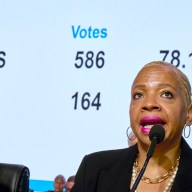TORONTO – The Canadian dollar closed higher Thursday as the currency gained traction on higher commodity prices and a vow by the U.S. Federal Reserve to keep interest rates low to support the American economy.
The loonie rose 0.18 of a cent to 99.83 cents US after going as high as 100.05 cents US earlier in the session.
On Wednesday, the Fed said it would keep interest rates near zero until late 2014 in a sign that the U.S. economy needs considerable support for some time to come.
“Risk sentiment has been buoyed by the outcome of yesterday’s FOMC meeting,” said a commentary from Barclays Capital Research.
“Overall, the extent of this forward guidance was beyond what markets currently expected, so amounts to an easing of monetary policy.”
Although the move signalled that the U.S. economy is still fragile, the central bank also indicated that another round of quantitative easing is being considered. Quantitative easing involves the Fed printing more money to buy bonds.
The Fed announcement encouraged traders to take on more risk and prices for oil and metals advanced.
The March crude contract on the New York Mercantile Exchange gained 30 cents to US$99.70 a barrel.
The March copper contract on the Nymex rose seven cents to US$3.90 a pound while the February gold bullion contract advanced $26.60 to US$1,726.70 an ounce.
There was also positive news out of Europe.
Italy easily raised €5 billion from the markets Thursday in a pair of bond auctions that saw a sharp drop in borrowing rates.
The sale showed healthy investor appetite in the first test of market sentiment since ratings agency Standard & Poor’s on Jan. 13 dropped Italy’s credit rating by two notches.
Italy has seen its borrowing costs ease in recent weeks, after yields on benchmark 10-year bonds pushed to the perilous seven-per cent level last year. The 10-year bonds were trading at 6.04 per cent on the secondary market after Thursday’s auction.
And Greece resumed talks with its private creditors in order to get a deal to avoid a potentially disastrous default.
The €100-billion private debt writedown is a vital condition of a new bailout for Greece, which has been relying on international rescue loans since May 2010.
Under the deal, banks and other private sector investors would swap their Greek government bonds for new ones with half the face value, longer repayment deadlines and potentially lower interest rates.
If the writedown fails, Greece will be unable to repay a €14.5-billion bond on March 20.
















